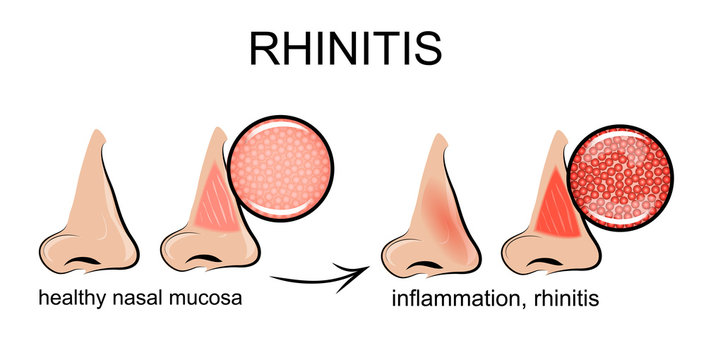Allergic rhinitis is caused by contact with allergic substances such as pollen or dust mites and is characterized by a runny nose, sneezing, itchy nose, and itchy eyes. According to Chinese medicine, allergic rhinitis is closely related to the five organs, so the focus of treatment is to regulate the five organs.
How is allergic rhinitis related to the five organs?
1. Spleen
According to Chinese medicine, the spleen is the foundation of the later day and the source of qi and blood. The qi and blood generated by the spleen can nourish every tissue and organ. Spleen qi deficiency can affect qi and blood biochemistry, and cannot nourish the stomach, and the function of the spleen and stomach to elevate clearness and reduce turbidity also declines, and the evils of dampness and turbidity can block the nose and orifices, resulting in headache, dizziness, sneezing, itching of the nose and eyes, and loose stools.
2. Lung
The nose is the outer orifice of the lungs, the nose’s breathing function and sense of smell are closely related to the lungs. Lungs are very delicate, high temperature, cold, and dryness will hurt the lungs. Heat invades the lungs, which can easily cause runny nose, chest tightness, and cough; cold invades the lungs, which can lead to the loss of lung qi propagation, manifested as sneezing, fear of cold, easy to sweat, runny nose, etc.; dryness invades the lungs, which can lead to dryness of the throat and nose and a dry cough with no phlegm.
3. Kidney
Kidney yang is the root of all yang, insufficient kidney yang is difficult to warm the lungs and spleen, the body in the cold water on the flood, which in turn causes paroxysmal itching of the nose, runny nose, and sneezing, accompanied by an increase in the number of nighttime urination, lumbar and knee soreness, fear of cold and fear of cold, and so on.
4. Heart
Heart fire and evil heat can cause nose itching and sneezing. The heart is the monarch, not easy to be invaded by evil, and the internal organs related to the heart are susceptible to evil, the heart and the small intestine are in a relationship with each other, easily inducing allergic rhinitis, resulting in heart fire hyperactivity, which manifests itself in increased urination, sores on the tongue and mouth, thirst and love to drink cold beverages, facial flushing, distraction.
5. Liver
Nose disease is closely related to the liver and gallbladder. Liver main diarrhea and diarrhea dysfunction can cause dampness and heat stagnation in the body, which leads to allergic rhinitis. The rhinitis caused by the liver and gallbladder is often accompanied by irritability, dry mouth, bitter mouth, depression, and so on.
How to regulate allergic rhinitis?
1. Sufficient sleep
Often staying up late can consume fluid and hurt blood, so you need to have enough sleep every day, not less than 7 hours of sleep a day; according to your situation choose moderate exercise, but not too tired.
2. Adjust your diet
Pay attention to the diet is light and easy to digest, eat less or do not eat cold food, so as not to hurt the spleen and stomach and aggravate the symptoms of allergic rhinitis.
Warm tips
In daily life, you can eat more food with the effect of nourishing yin and generating fluids, such as walnut congee, lily congee, red dates, lily glutinous rice congee, and so on, and stay away from spicy and hot food, eat more fresh vegetables and fruits, and maintain smooth feces. Increase or decrease clothing according to the weather, do not stay in air-conditioned rooms for a long time; eat a light diet and have a regular rest routine; wear a mask when going out and try not to come into contact with allergens.
